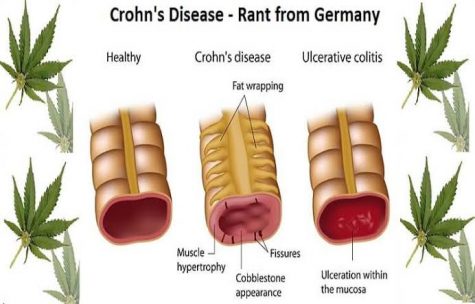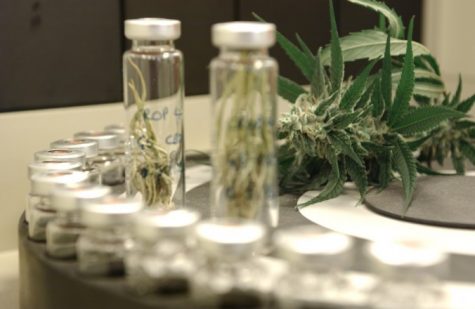Cannabis may relieve the symptoms of Crohn’s disease, scientists say
Individuals with Crohn’s disease may soon be swapping traditional over-the-counter (OTC) medications for cannabis. Well, that’s if scientists can keep up the good work in demonstrating the plant’s medicinal properties for the treatment of gut inflammation.
Based on recent research that was unveiled at a conference, cannabis for Crohn’s disease may prove beneficial for sufferers. However, it does not work its magic by reducing the symptoms of gut inflammation.
“We know,” says the leader of the study, Dr. Timna Naftali. She is a specialist in gastroenterology at Tel Aviv University’s Meir Hospital and Israel’s Kupat Holim Clinic in Israel.
Naftali says the findings of the study on cannabis for Crohn’s disease indicates “that cannabinoids can have profound anti-inflammatory effects, but this study indicates that the improvement in symptoms may not be related to these anti-inflammatory properties.”
She presented an audience at the United European Gastroenterology annual meeting with her findings. The UEG Week 2018 event took place in Vienna, Austria from Oct 20-Oct 24.
Cannabis for Crohn’s disease: The condition affects millions of Americans

As many as 1.6 million people suffer from the symptoms of Crohn’s disease in the United States, according to the Crohn’s Colitis Foundation. Those symptoms refer to gut inflammation, also known as irritable bowel disease (IBD). Inflammation occurs as a result of the immune system destroying gastrointestinal tract tissues.
Individuals who endure the symptoms of this debilitating condition which can cause inflammation anywhere between the mouth and the anus, will find the simplest of tasks a struggle. Pain, cramping, diarrhea, constipation and bleeding are just a few examples of the chronic symptoms of Crohn’s disease.
Due to legal constraints, it is not currently possible for scientists to openly study cannabis’ medicinal qualities. The level of psychoactive compounds like tetrahydrocannabinol or “THC” and non-psychoactive compounds like cannabidiol or “CBD” will vary, depending on the specific cannabis strain. Since cannabis prohibition puts restrictions on cultivation, scientists are limited with their research.
On a more positive note, restrictions are gradually being lifted on cannabis research, despite the fact weed has not yet been given the go-ahead as a medical treatment by the Food and Drug Administration (FDA).
According to Dr. Naftali, “many people with Crohn’s disease use cannabis regularly to relieve their symptoms.” Naftali and a team of scientists took things to the next level by delving into the reason(s) why cannabis proves useful for relieving inflammation.
Perhaps other doctors and scientists were wrong in assuming that it was because of the plant’s anti-inflammatory effect?
Well, Naftali and her colleagues studied a total of 46 Crohn’s disease sufferers, whose symptoms were moderately severe. The patients were split into two groups, both of which received a treatment for eight weeks. Cannabis oil (containing four percent THC and 15 percent CBD) was administered to half of the patients, while the other half were administered with a placebo.
Research-validated assessment tools were utilized by scientists to accurately determine symptom severity and quality of life. Endoscopic exams, stool samples and markers in blood were three experiments used to assess gut inflammation following treatment.
Crohn’s disease symptoms appeared to drop among the cannabis-consuming group, but the same could not be said for the placebo group. Based on the results of this study on cannabis for Crohn’s disease, 65 percent of study participants in the cannabis oil group adhered to “strict criteria for clinical remission” of Crohn’s disease, while a mere 35 percent of the placebo group met the criteria.
Individuals who were treated using cannabis oil demonstrated positive improvements in their quality of life measures, whereas the placebo group members did not.
Dr. Naftali drew attention to the fact that the outcome of her study on cannabis for Crohn’s disease supports the theory that receptors inside the human body bind with cannabinoids, inside the endocannabinoid system or the “ECS”. Those receptors could be selected and treated in patients with gastrointestinal medical problems, like Crohn’s disease. In the near future, Dr. Naftali and her team of researchers will further investigate the cannabis plant’s anti-inflammatory effects.









